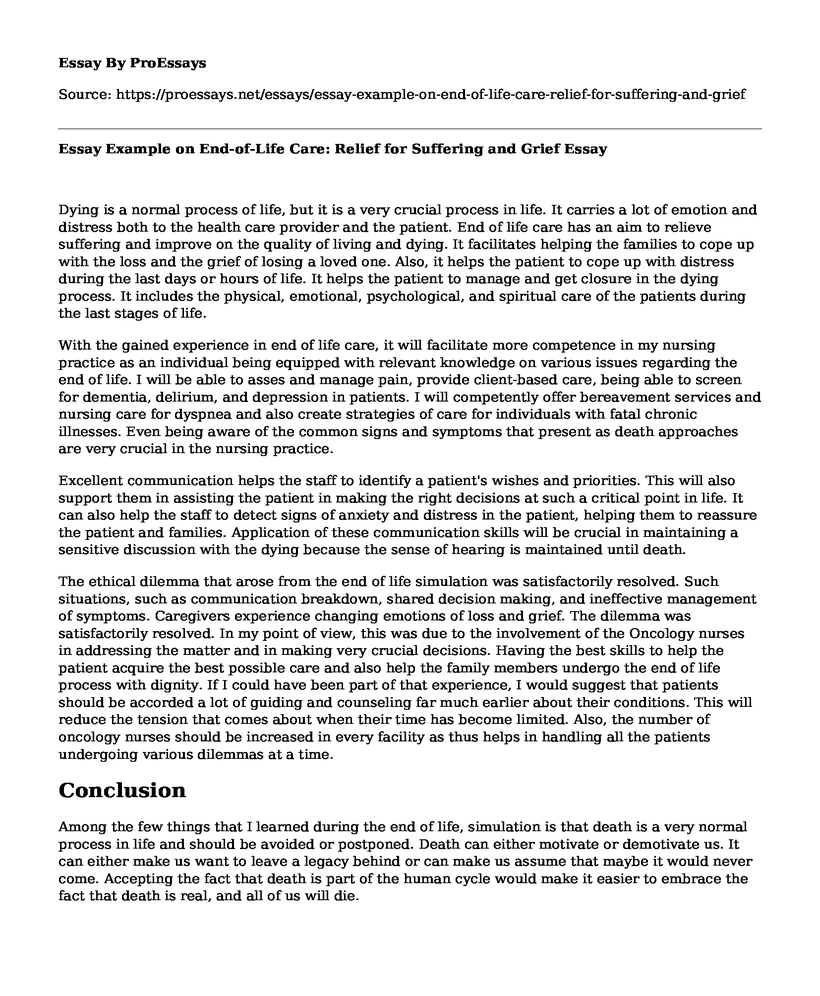Dying is a normal process of life, but it is a very crucial process in life. It carries a lot of emotion and distress both to the health care provider and the patient. End of life care has an aim to relieve suffering and improve on the quality of living and dying. It facilitates helping the families to cope up with the loss and the grief of losing a loved one. Also, it helps the patient to cope up with distress during the last days or hours of life. It helps the patient to manage and get closure in the dying process. It includes the physical, emotional, psychological, and spiritual care of the patients during the last stages of life.
With the gained experience in end of life care, it will facilitate more competence in my nursing practice as an individual being equipped with relevant knowledge on various issues regarding the end of life. I will be able to asses and manage pain, provide client-based care, being able to screen for dementia, delirium, and depression in patients. I will competently offer bereavement services and nursing care for dyspnea and also create strategies of care for individuals with fatal chronic illnesses. Even being aware of the common signs and symptoms that present as death approaches are very crucial in the nursing practice.
Excellent communication helps the staff to identify a patient's wishes and priorities. This will also support them in assisting the patient in making the right decisions at such a critical point in life. It can also help the staff to detect signs of anxiety and distress in the patient, helping them to reassure the patient and families. Application of these communication skills will be crucial in maintaining a sensitive discussion with the dying because the sense of hearing is maintained until death.
The ethical dilemma that arose from the end of life simulation was satisfactorily resolved. Such situations, such as communication breakdown, shared decision making, and ineffective management of symptoms. Caregivers experience changing emotions of loss and grief. The dilemma was satisfactorily resolved. In my point of view, this was due to the involvement of the Oncology nurses in addressing the matter and in making very crucial decisions. Having the best skills to help the patient acquire the best possible care and also help the family members undergo the end of life process with dignity. If I could have been part of that experience, I would suggest that patients should be accorded a lot of guiding and counseling far much earlier about their conditions. This will reduce the tension that comes about when their time has become limited. Also, the number of oncology nurses should be increased in every facility as thus helps in handling all the patients undergoing various dilemmas at a time.
Conclusion
Among the few things that I learned during the end of life, simulation is that death is a very normal process in life and should be avoided or postponed. Death can either motivate or demotivate us. It can either make us want to leave a legacy behind or can make us assume that maybe it would never come. Accepting the fact that death is part of the human cycle would make it easier to embrace the fact that death is real, and all of us will die.
Cite this page
Essay Example on End-of-Life Care: Relief for Suffering and Grief. (2023, Mar 13). Retrieved from https://proessays.net/essays/essay-example-on-end-of-life-care-relief-for-suffering-and-grief
If you are the original author of this essay and no longer wish to have it published on the ProEssays website, please click below to request its removal:
- Essay Sample on Application of Information Technology in San Antonio University Hospital
- Reflective Essay on Starting Nursing School: Mixed Feelings and New Experiences
- Paper Example on Health & Safety Management: Challenges & Solutions
- Essay Example on Sports Injury: Acute and Overuse Injury Types
- Essay on Public Health Capacity: Challenges and the Need for Competency-Based Guidelines
- Eating Out During COVID-19: Is Takeout & Delivery Safe? - Essay Sample
- Essay Example on Climate Change: Impact on Human Behaviour and Long-Term Health







